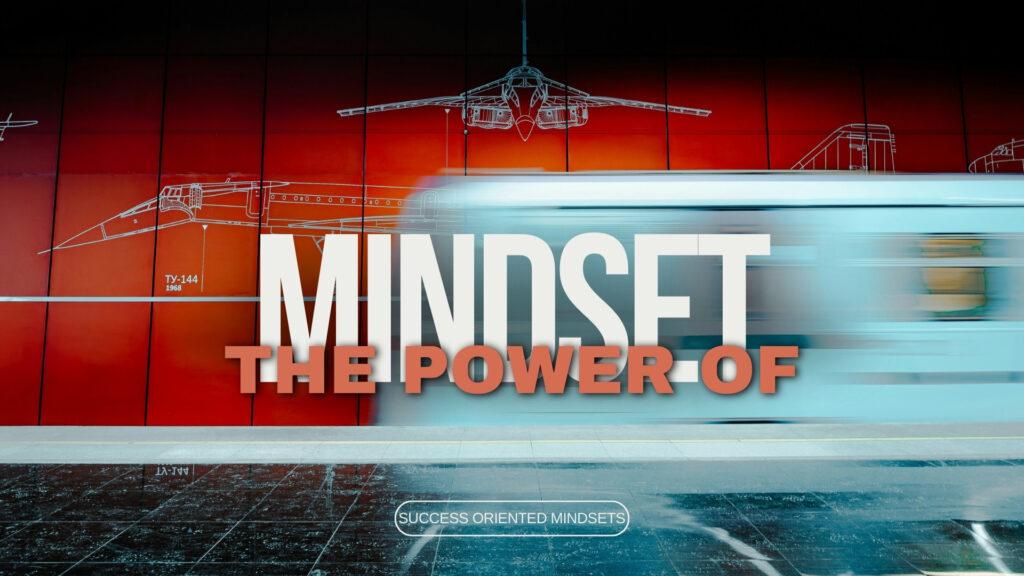- Transform Your Life: The Power of Success Oriented Mindsets
- Growth Mindset for Success: Strategies to Achieve Your Goals
- The Power of Positive Affirmations in Achieving Your Dreams
What are Success Oriented Mindsets?
Success oriented mindsets refer to a set of attitudes and beliefs that encourage goal-oriented thinking, growth, and resilience in the face of challenges. Your mindset is like a mental operating system that filters your experiences and shapes your decisions. It is a powerful tool that influences your determination, choices, and reaction to both successes and setbacks. Essentially, your mindset can become a deciding factor in whether you achieve your goals or feel limited by your circumstances.
Why Mindset Matters: The Power of Belief

Your mindset is not just a collection of thoughts. In fact, it can shape your reality and act as a powerful force in your life. If you believe you are incapable of something, those beliefs can become self-fulfilling. You may subconsciously avoid opportunities, give up too soon, or simply not put in enough effort required for success. On the other hand, if you believe in your own potential – even when faced with challenges – your actions will naturally align with that belief, increasing your chances of reaching your goals.
Life is full of inevitable challenges. However, the difference between those who thrive and those who get stuck often lies in their mindset. A resilient mindset views obstacles not as roadblocks but as opportunities for growth and learning. When you expect setbacks and see them as temporary, you’re more likely to find solutions and persevere rather than becoming discouraged and giving up.
Your mindset acts as both a compass and a fuel source. It guides your direction and determines your stamina in the pursuit of your goals and a fulfilling life. Remember that your beliefs have the power to shape your reality, so choose them wisely.

1. Growth Mindset
The growth mindset is based on the fundamental belief that your intelligence, talents, and abilities are not fixed traits. Instead, they can be developed through dedication, hard work, and a willingness to learn. People with a growth mindset:
- Embrace Challenges: They see challenges as opportunities for growth, not as threats to their self-worth.
- View Mistakes as Stepping Stones: Rather than feeling defeated by errors, they analyze mistakes to find lessons and improve their strategies for the future.
- Focus on the Process: They value the journey of learning and improvement as much as the outcome.
- Find Inspiration in the Success of Others: Rather than feeling threatened by others’ accomplishments, they find motivation to learn and better themselves.
Cultivating a growth mindset involves shifting your language. Instead of saying “I’m not good at this,” say “I’m not good at this yet.” Focus on effort over innate talent, and seek mentors or resources that can help you expand your abilities.
Go Deep: GROWTH MINDSET FOR SUCCESS: STRATEGIES TO ACHIEVE YOUR GOALS

2. Positive Mindset: The Power For Success
A positive mindset is all about emphasizing optimism, focusing on solutions, and believing in favorable outcomes. It doesn’t mean ignoring negativity or challenges, but rather choosing not to let negativity define your outlook. People who have a positive mindset:
- See the Good: They actively seek out the positive aspects of situations, even during difficult times.
- Solution-Oriented: Instead of dwelling on problems, they focus their energy on finding ways to overcome them.
- Cultivate a ‘Can-Do’ Attitude: They believe in their ability to handle challenges and create positive change.
Reframing Negative Thoughts
A key part of a positive mindset is learning to reframe negative self-talk and limiting beliefs. Here’s how:
- Identify Negative Thoughts: Become aware of the critical inner voice that tells you things like “I’m not good enough,” or “It’ll never work.”
- Challenge the Negativity: Ask yourself “Is this thought truly accurate? Is there evidence to support it?”
- Reframe with Positivity: Replace the negative thought with a more empowering and realistic one. For example, instead of “I’ll fail,” think “I might face challenges, but I’ll give it my best shot and learn from the experience.”
Developing a positive mindset takes practice. Start with small victories, celebrate your successes, and surround yourself with supportive people and embrace the same success oriented mindsets.

3. Abundance Mindset
The abundance mindset is a perspective that is based on the belief that there are enough resources, opportunities, and success for everyone. It is an approach that rejects the idea of scarcity and the notion that you have to compete with others to get what you want. People who have an abundance mindset possess the following qualities:
- See Opportunity Everywhere: They look at the world with a sense of possibility, believing that resources and solutions are readily available.
- Focus on Gratitude: They appreciate what they already have, fostering contentment and attracting more positive experiences.
- Collaboration over Competition: They view collaboration as a path to greater success for all involved.
- Celebrate the Success of Others: They experience genuine joy and happiness for others’ achievements, which in turn eliminates feelings of ‘lack’ within themselves.
Cultivating an Abundance Mindset:
- Practice Gratitude: Keep a gratitude journal, focusing on the positive aspects of your life.
- Challenge Scarcity-Based Beliefs: Notice thoughts of “not enough” and replace them with “There’s plenty for me, and I’m working towards my goals.”
- Give Generously: Share your time, knowledge, or resources with others. This reinforces the belief in abundance.
The abundance mindset creates a powerful shift in perspective, attracting more positive opportunities, collaborations, and a fulfilling sense of prosperity.

4. Gratitude Mindset: The Key to Happiness and Abundance
A gratitude mindset means focusing on cultivating a deep appreciation for the good things in your life, no matter how big or small they are. It’s about noticing the positive things around you and shifting your focus away from negativity. People who have a gratitude mindset can:
- Experience Increased Happiness: Studies have linked gratitude directly to higher levels of well-being and positive emotions.
- Build Resilience: Gratitude helps you focus on positive aspects even in difficult times, which can promote resilience and faster recovery from setbacks.
- Strengthen Relationships: Expressing gratitude nurtures connection and strengthens bonds with others.
- Attract More Good Things: Focusing on what you have can attract more positive experiences into your life, also known as the ‘Law of Attraction‘ effect.
If you want to cultivate a gratitude mindset, here are some things you can do:
- Keep a Gratitude Journal: Dedicate a few minutes every day to writing down things you’re grateful for.
- Express Gratitude Outwardly: Share your appreciation with loved ones, colleagues, or even strangers for acts of kindness.
- Mindful Appreciation: Take time to truly savor positive experiences and notice the small details that bring you joy.
Gratitude isn’t just a pleasant feeling, it’s a transformative practice that can boost your overall well-being and attract more positivity into your life.

5. Success Mindset: A Blueprint for Achievement
The Success Mindset is a powerful combination of two main mindsets – the growth mindset and the positive mindset. It emphasizes optimism, learning, and improvement while having a laser-sharp focus on goals and an unwavering persistence in the face of obstacles.
People with a Success Mindset always define what success means to them and create actionable plans to achieve it. They see the process of learning, growth, and overcoming obstacles as integral to their success. When they face setbacks, they analyze them for lessons, adjust their approach, and keep moving forward. They also cultivate a network of mentors, peers, and cheerleaders to support them and maintain their unshakable belief in their potential and ability to achieve their desired outcomes.
To cultivate a Success Mindset, you should set SMART goals – Specific, Measurable, Achievable, Relevant, and Time-bound goals that give you clear direction. You should also regularly visualize yourself achieving your goals with great detail and emotion. Celebrating milestones is also important to acknowledge and reward your progress to maintain motivation. And never stop learning! Continuously develop the skills and knowledge needed to reach your goals.
A Success Mindset isn’t about constant perfection; it’s about dedication, flexibility, and the determination to keep pushing toward your dreams.

6. Confident Mindset
A confident mindset involves having a strong belief in yourself, a healthy level of self-esteem, and trust in your own abilities. It means knowing your worth and believing that you can handle any situation that comes your way. People with a confident mindset have the following traits:
- Take Calculated Risks: They are not afraid to step out of their comfort zone to pursue opportunities.
- Speak with Assertiveness: They communicate their needs and opinions clearly and respectfully.
- Embrace Their Strengths: They are aware of their talents and don’t shy away from using them.
- Learn from Mistakes: They view mistakes as opportunities for growth instead of letting them erode their self-belief.
To cultivate a confident mindset, one can do the following:
- Challenge Negative Self-Talk: Replace limiting beliefs with positive affirmations about your capabilities.
- Celebrate Your Wins: Acknowledge your achievements, both big and small, to build a track record of success.
- Focus on Your Growth: Continuously learn and develop new skills to increase your sense of competence.
- Surround Yourself with Positive People: Limit time spent with those who erode your confidence and seek out those who uplift you.
Having a confident mindset allows you to approach life with greater self-assurance, leading to better decision-making, stronger relationships, and a higher probability of achieving your goals.

7. Entrepreneur Mindset: The Innovator’s Edge
Entrepreneurs possess a unique blend of traits that enable them to thrive in the dynamic business world. The entrepreneur mindset embraces calculated risk-taking, adaptability, a solution-oriented approach, and resilience. Entrepreneurs understand that calculated risks are often necessary for growth and innovation and carefully assess potential rewards against risks before acting. They embrace change and quickly pivot their strategies to see uncertainty as an opportunity. Entrepreneurs relentlessly focus on finding creative solutions that address the needs of their customers. They are resourceful and think outside the box, bouncing back from setbacks and learning from every failure to become stronger.
To cultivate an entrepreneurial mindset, individuals should continuously expand their knowledge of business strategies, their industry, and emerging trends. Building relationships with other entrepreneurs, potential mentors, and industry experts is also crucial. Starting with small, calculated risks and gradually increasing the comfort level with uncertainty is key. Don’t be bogged down by analysis paralysis. Start experimenting, testing your ideas, and learn as you go.
The entrepreneurial mindset is essential for anyone striving to build a successful business, but its principles of adaptability and innovation are valuable in all aspects of life.

8. Creative Mindset
Having a creative mindset means fostering your curiosity, embracing open-mindedness, and discovering innovative solutions to problems. Individuals with a creative mindset
- Question Everything: They are not afraid to challenge conventional wisdom and look for new perspectives.
- Embrace the Unknown: They possess a natural sense of wonder and are willing to explore uncharted territories with an open mind.
- See Connections Everywhere: They draw connections between seemingly unrelated ideas, which leads to unique and innovative solutions.
- Fail Forward: They understand that experimentation is part of the creative process and treat mistakes as valuable learning opportunities.
Developing a Creative Mindset:
- Engage Your Curiosity: Ask “why” and “what if” questions as often as possible. Explore topics that fascinate you.
- Break Routines: Make small changes in your routine to spark new ways of thinking.
- Embrace Play: Creativity often flows in unstructured time. Make room for activities that ignite your imagination.
- Learn from Diverse Sources: Seek inspiration from a broad range of fields, ideas, and cultures.
A creative mindset is critical for resolving issues in novel ways, adapting to change, and generating innovative ideas that benefit your personal and professional life.

9. Challenge Mindset: Thrive on Obstacles
The Challenge Mindset is a way of looking at obstacles as opportunities for growth, learning, and innovation. People with a challenge mindset get excited by difficulty, as it stimulates their problem-solving skills and fuels their determination. They actively look for the potential for growth and gain within each challenging situation, and persevere through setbacks, knowing that challenges strengthen their abilities. They embrace learning and see challenges as a chance to gain new knowledge and skills.
To cultivate a challenge mindset, it is recommended that you shift your language by replacing “problem” with “challenge” or “opportunity for growth.” Focus on what you can control, instead of dwelling on what you can’t change, and celebrate small wins as each step you take toward overcoming a challenge builds your confidence. Seeking support from mentors or peers who embody a challenge mindset can offer guidance and inspiration.
The challenge mindset is a powerful tool for turning setbacks into stepping stones, allowing you to thrive on adversity and consistently reach new heights.

10. Mindful Mindset: Finding Focus and Clarity
A mindful mindset involves being present in the moment and observing your thoughts and emotions without being judgmental. People who adopt a mindful mindset experience several benefits, including increased focus, reduced stress and anxiety, greater self-awareness, and improved decision-making skills.
You can cultivate a mindful mindset by practicing meditation regularly, taking short breaks throughout the day to focus on your breath and surroundings, journaling to reflect on your thoughts and emotions in a non-judgmental way, and seeking guidance from resources such as mindfulness courses, books, and apps.
Embracing a mindful mindset to achieve greater clarity, focus, and emotional balance in all aspects of your life, enabling you to make better decisions and improve your overall well-being.

11. Productive Mindset: Master Your Time and Energy
A productive mindset is essential for making the most of your time, focusing on your priorities, and achieving your goals efficiently. People with a productive mindset:
- Prioritize Ruthlessly: They understand the importance of identifying and focusing on the most important tasks.
- Combat Distraction: They create environments conducive to concentration and minimize interruptions.
- Break Tasks Down: Large projects feel less daunting when broken into smaller, manageable steps.
- Master Procrastination: They understand the triggers leading to procrastination and develop techniques to overcome this tendency.
To cultivate a productive mindset, consider using techniques such as:
- The “Eat the Frog” Technique: Tackle your most important or challenging task first thing in the day.
- Time Blocking: Schedule specific blocks of time for different tasks throughout your day.
- The Pomodoro Technique: Work in focused intervals (e.g., 25 minutes) with short breaks in between.
- Reward Yourself: Celebrate milestones and completed tasks to maintain motivation.
Bonus Tip: Track where you actually spend your time. This awareness is often eye-opening and helps with better time management.
A productive mindset allows you to accomplish more with less stress and free up time and energy for the things that matter most to you.

12. Social Mindset: The Power of Connection
A social mindset is crucial for building strong relationships, effective communication skills, and working collaboratively with others. Those who possess a strong social mindset share the following traits:
- Build Trust: They prioritize honesty, integrity and follow-through in their interactions with others.
- Value Collaboration: They understand that greater success often comes from working together towards a shared goal.
- Communicate Effectively: They express themselves clearly, listen actively and seek to understand different perspectives.
- Promote Inclusivity: They create environments where everyone feels valued and respected.
- Empathy and Emotional Intelligence: They are attuned to the emotions and needs of others, fostering stronger connections.
Cultivating a Social Mindset involves:
- Become a Great Listener: Paying full attention to the person speaking, asking clarifying questions, and avoiding interrupting.
- Practice Empathy: Trying to understand the perspectives and feelings of those around you.
- Network Strategically: Building relationships with people in your field, mentors, and potential collaborators.
- Seek Feedback: Being open to constructive criticism to improve your communication and relationship-building skills
A strong social mindset unlocks opportunities, enriches your personal and professional life, and helps you create a positive impact on those around you.

13. Purposeful Mindset: Find Your ‘Why’
A purposeful mindset is rooted in having a profound sense of meaning and ensuring that your actions and goals align with your core values. Individuals who possess a purposeful mindset have the following characteristics:
- Know Their ‘Why’: They understand the driving force behind their work and life choices.
- Experience Greater Motivation: Their sense of purpose fuels their persistence and resilience in the face of challenges.
- Increased Fulfillment: Living in alignment with their values brings a deep sense of contentment and satisfaction.
- Make Values-Based Decisions: Their choices reflect their core beliefs and what matters most to them.
To cultivate a purposeful mindset, you can take the following steps:
- Reflect on Your Values: Determine what truly matters to you and what kind of impact you want to make on the world.
- Identify Your Strengths: Discover what you are naturally good at and passionate about, as these can provide clues to your purpose.
- Take Action: Align your daily life and career choices with your values and purpose. Look for opportunities that contribute to something larger than yourself.
- The Power of Community: Connect with others who share similar values and purpose.
A purposeful mindset serves as a compass, guiding you towards a life of meaning, fulfillment, and positive impact.

How to Change Your Mindset
The first step to changing your mindset is to become self-aware of your current dominant mindset. Here’s how you can identify it:
- Self-Reflection: Take some time for honest introspection. Consider the following:
- Recurring Thoughts: What types of thoughts frequently run through your mind? Are they positive, negative, focused on growth, or limitations?
- Reactions to Challenges: How do you typically respond to setbacks? Do you give up easily, get motivated to try harder, or focus on analyzing the situation for a new solution?
- Language Patterns: Pay attention to the words you use. Are you prone to phrases like “I can’t” or “I’ll try,” or do you use more affirmative language like “I can” and “I will?”
- Journaling: Recording your thoughts and reactions over a period of time can reveal patterns you may not immediately notice.
- Seek Feedback: Ask trusted friends, family, or colleagues how they perceive your mindset. Their outside perspective can be invaluable.
Understanding your current mindset is the first step to making changes. It gives you a baseline to start working from, allowing you to consciously choose which mindsets you want to strengthen and which ones you need to transform.
Challenge Limiting Beliefs: Question Negative Self-Talk and Beliefs That Hold You Back
Challenge your Limiting Beliefs: Question the Negative Self-Talk and Beliefs that Hold You Back. Once you become aware of your mindset, it is time to break down the limiting beliefs that may be preventing you from moving forward. These beliefs could be about yourself, your abilities, or the world around you.
Here’s how to tackle them:
- Identify Them: Pay close attention to the critical inner voice that says things like “I’m not smart enough,” “I’ll never succeed,” or “This is too hard.” Write these limiting beliefs down.
- Question Their Validity: Ask yourself:
- IIs this belief really true? Is there evidence to support it?
- Are there any examples that contradict this belief?
- Where did this belief come from? Is it a past experience or someone else’s opinion that you’ve internalized?
- Reframe with Empowering Beliefs: Replace the limiting belief with a more positive and empowering one. For instance:
- Instead of “I’ll never be good at this,” tell yourself, “I’m still learning, and with practice, I will improve.”
- Instead of “I’m a failure,” think “Mistakes are part of the learning process, and I’m one step closer to success.”
Key Tip: Challenge your limiting beliefs just like you would have a debate with your friend. Provide logic, counter-examples, and support for your new empowering beliefs.
Positive Affirmations: Replace Negative Thought Patterns with Positive, Empowering Statements
Positive affirmations are short and powerful statements that can help reprogram your subconscious mind and replace limiting beliefs with more positive ones. Repeating them regularly can be an effective way to achieve this. Here are some tips on how to use affirmations effectively:
- Make Them Personal: Use “I” statements to focus on your desired qualities and goals. For example, “I am capable and resilient.”
- Keep Them Present Tense: Affirmations are most effective when phrased as if the desired quality or outcome is already true. For example, “I am confident” rather than “I will be confident.”
- Repeat Regularly: Say your affirmations out loud, write them down, or listen to recordings. The key is consistency.
- Believe and Visualize: Don’t just say the words – feel the emotions behind them. Visualize yourself embodying the positive qualities of your affirmations.
Here are some examples of positive affirmations:
- I am worthy of success and happiness.
- I am capable of overcoming challenges.
- I trust my abilities and decisions.
- My potential is limitless.
- I am grateful for my blessings.
It’s important to remember that while affirmations are a powerful tool, they work best alongside conscious actions that support your desired mindset shift.
Role model: Seek Inspiration from People Who Embody the Success oriented mindsets You Want to Cultivate.
Role models can have a powerful impact on our mindsets by showing us what’s possible and providing a roadmap for change. To develop the mindset you desire, look for role models who embody it. These could be historical figures who overcame adversity, contemporary leaders in your field who demonstrate success-oriented mindsets, or people in your life who possess admirable qualities or mindsets.
Role models help by providing proof that your desired mindset is attainable, inspiring and motivating you to keep striving even when facing obstacles, and offering practical strategies that you can learn from.
You can find role models by reading biographies, watching documentaries, listening to interviews, or even reaching out to individuals who inspire you. Surrounding yourself with their influence can accelerate your own mindset shift.
Mindset is a Practice: Read Books, Take Courses, and Work Towards Consistent Growth.
Shifting your mindset is not a one-time fix, rather it’s a continuous practice of growth and development. Here’s how you can keep your mindset evolving:
- Lifelong Learning: Commit to lifelong learning and ongoing self-improvement. There are plenty of resources you can use to achieve this, such as:
- Reading books on personal development, specific mindsets, and success stories of inspirational figures.
- Exploring online courses or local workshops on topics like mindfulness, overcoming limiting beliefs, productivity, and more.
- Seeking guidance from a mentor or coach who specializes in mindset development.
- Accountability: Share your goals with supportive friends or find an accountability partner who will keep you motivated and on track.
- Celebrate Progress: Acknowledge every step forward, no matter how small. Celebrating progress reinforces positive change!
- Embrace the Process: Changing your mindset takes time and effort. Be patient with yourself, trust the process, and keep investing in your growth.
Note: A growth-oriented mindset is not just about achieving goals; it’s about embracing the journey of constant self-improvement and becoming the best version of yourself.
Conclusion

Your mindset is the powerful lens through which you perceive yourself, the world, and your place within it. It shapes your choices, actions, and ultimately the outcomes you experience in life and business. Cultivating success-oriented mindsets like growth, positivity, abundance, confidence, mindfulness, and purposefulness sets you on the path towards reaching your full potential.
Remember, your mindset is not a fixed trait. With conscious effort, dedication, and the right tools, your mindset can evolve. By actively questioning limiting beliefs, adopting positive affirmations, learning from role models, and embracing continuous development, you empower yourself to create a life of greater fulfillment, success, and lasting impact.







